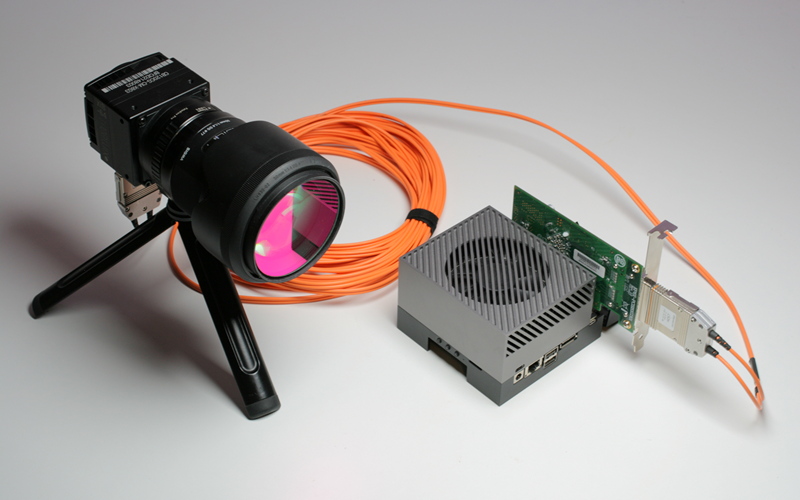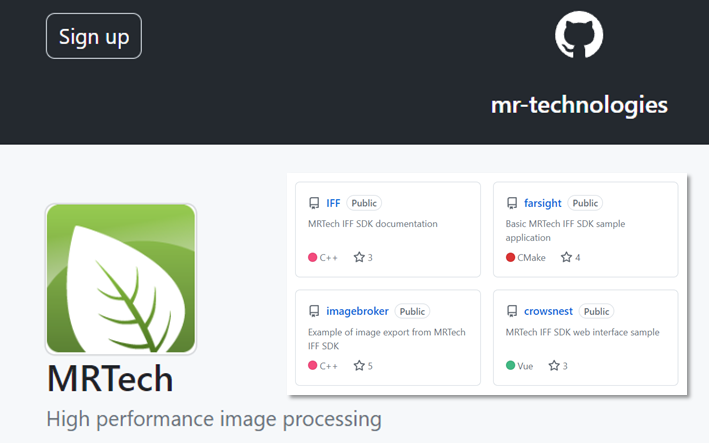10 reasons to use IFF SDK in your Machine Vision project
MRTech IFF SDK is a powerful cross-platform toolkit for image acquisition and high-performance image processing in machine vision systems.
Here are 10 main reasons to need it for your project:
1. Your project requires a top-end performance of the camera system. With IFF SDK you will be able, for example, to capture raw 8K 10-bit images at 115 FPS and process them (applying black level subtraction, histogram calculation, white balance, demosaicing, color correction, etc.) in real-time or write image streams from two such cameras (in raw, TIFF or DNG formats) to RAID storage with a 10 GB/s throughput and without frame loss.
2. You need ultra-low processing and streaming latency, unnoticeable to the human eye. With IFF SDK it is possible to achieve 35ms Glass-to-Glass latency by receiving FullHD raw images from a camera, processing (including H.265 encoding) on a NVIDIA Jetson Orin system and streaming to a receiving computer (also, optionally, powered by IFF SDK) using the RTSP (or alternatively WebRTC) network protocol.
3. You want to quickly get first results. Your project can get a head start by re-using the source code and configuration files of the IFF SDK sample applications. There are examples for image acquisition, color pre-processing, writing to disk, H.264/H.265 encoding, RTSP/WebRTC streaming, integrating the processing pipeline with custom OpenCV code (on-screen rendering implementation is provided).
4. You need excellent image quality and faithful colors. IFF SDK has high-performance modules for high-quality demosaicing, color processing (DNG-compatible) and denoising. A handy tool to create DNG color profiles (DCP) is also provided with the IFF SDK package.
5. You want freedom to choose a camera manufacturer for your system or maybe even a possibility to easily swap camera models without changing your code. IFF SDK supports a variety of machine vision cameras with USB3, Ethernet and PCIe interfaces using GenTL or vendor APIs. IFF SDK also works with MIPI cameras through Video4Linux2 API and supports the GMSL camera interface. In general only configuration file requires adjustment for specific camera model, while code stays the same. Of course your system can also have multiple (potentially different) cameras, limited only by the performance of your hardware.
6. You want an option to have either real-time (with input directly from the camera) or offline processing (with input from the files). IFF SDK supports various input pixel formats, such as 8/10/12/14/16-bit raw or RGB, and output image formats, such as H.264/H.265 and TIFF/DNG/EXR (compatible, for example, with professional video editing application DaVinci Resolve).
7. IFF SDK is easy to learn, as it has a simple C API with just five basic functions plus an HTTP interface to control the image processing pipeline and a configuration file in a JSON format. A comprehensive technical manual and several quick-start and how-to articles are also available online on the MRTech website, which guarantees a quick learning curve.
8. You want a cross-platform solution in case you deploy your code on multiple platforms or for easier and faster code development. For example, you can develop your machine vision application under Windows and deploy it on a Linux machine or NVIDIA Jetson module.
9. You want production-ready code right from the start, allowing fast transition from prototype stage to deployment. High quality of the IFF SDK code is ensured by continuous testing in-house and field-proven in multiple real-life projects.
10. You need comprehensive technical support for your image acquisition and processing tasks. Our MRTech team provides extensive IFF SDK support, assistance in implementation and pre-project consulting, all powered by our know-how accumulated over 10+ years of experience in machine vision field.
To summarise, IFF SDK makes images flow so you can focus on your ultimate goal!
You can take MRTech IFF SDK for a free test drive right now.






